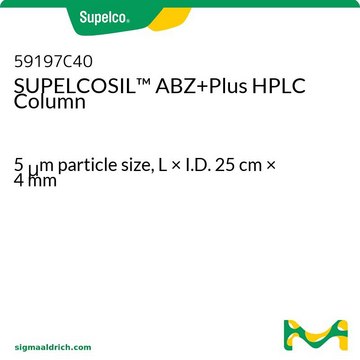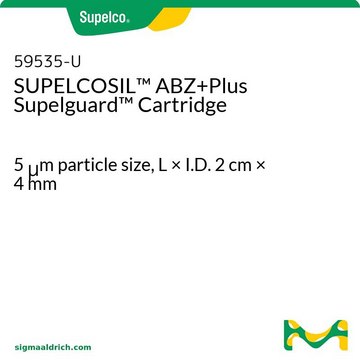59196
SUPELCOSIL™ ABZ+Plus (5 µm) HPLC Columns
L × I.D. 15 cm × 4.6 mm, HPLC Column
Sign Into View Organizational & Contract Pricing
All Photos(1)
About This Item
UNSPSC Code:
41115700
eCl@ss:
32110501
Recommended Products
product name
SUPELCOSIL™ ABZ+Plus HPLC Column, 5 μm particle size, L × I.D. 15 cm × 4.6 mm
Agency
suitable for USP L60
Quality Level
feature
endcapped
manufacturer/tradename
SUPELCOSIL™
extent of labeling
12.0% carbon loading
parameter
≤70 °C temp. range
400 bar pressure (5801 psi)
technique(s)
HPLC: suitable
L × I.D.
15 cm × 4.6 mm
surface area
170 m2/g
surface coverage
surface coverage 3.4 μmol/m2
matrix
silica gel, spherical particle platform
matrix active group
amide, alkyl phase
particle size
5 μm
pore size
120 Å
pH range
2-7.5
application(s)
food and beverages
separation technique
reversed phase
Looking for similar products? Visit Product Comparison Guide
Related Categories
General description
SUPELCOSIL ABZ+Plus columns offer both high deactivation and unique selectivity. Deactivated silica particles of very narrow particle size distribution ensure high efficiency with low back pressure. After bonding and endcapping reactions, the ABZ+Plus phase effectively shields unreacted silanol groups on the silica, preventing them from interacting with most analytes, and provides symmetric peaks regardless of an analyte′s functionality. The phase also allows you to use low ionic strength buffers without having to add an ion-suppressing modifier. ABZ+Plus enables you to use simple mobile phases when analyzing the most difficult compounds; acids, strongly basic compounds, and zwitterions.
suitable for L60 per USP
suitable for L60 per USP
Features and Benefits
• High efficiency for polar, nonpolar, and charged analytes
• Symmetric peaks for the most reactive compounds
• Unique selectivity for polar and charged compounds
• Symmetric peaks for the most reactive compounds
• Unique selectivity for polar and charged compounds
Legal Information
SUPELCOSIL is a trademark of Sigma-Aldrich Co. LLC
guard cartridge
Product No.
Description
Pricing
Choose from one of the most recent versions:
Already Own This Product?
Find documentation for the products that you have recently purchased in the Document Library.
Customers Also Viewed
Hoang Anh Nguyen et al.
Journal of chromatography. B, Analytical technologies in the biomedical and life sciences, 810(1), 77-83 (2004-09-11)
Liquid chromatography with a column-switching technique was developed for simultaneous direct quantification of levofloxacin, gatifloxacin and moxifloxacin in human serum. Serum samples were injected on a LiChroCART 4-4 pre-column (PC) filled with a LiChrospher 100 RP-18, 5 microm where fluoroquinolones
Tânia M G Almeida et al.
Chemistry & biodiversity, 2(12), 1691-1700 (2006-12-29)
Absorption, distribution, metabolism, and excretion (ADME) properties are of invaluable importance to a bioactive compound. Permeation process is one of the most widely studied by many different techniques. Among them, reversed-phase liquid chromatography (RP-LC) is proving to be of great
Zhongping John Lin et al.
Journal of pharmaceutical and biomedical analysis, 37(4), 757-762 (2005-03-31)
A highly sensitive method was developed and validated for determining the free fraction of flunarizine in human plasma. Equilibrium dialysis was used for the separation of free (unbound) drug and liquid chromatography/tandem mass spectrometry (LC-MS/MS) was used for quantitation. Post-dialysis
Konstantinos Petritis et al.
Journal of chromatography. A, 957(2), 173-185 (2002-07-13)
The single run analysis of 23 small peptides (principally glycyl and lysyl dipeptides) is performed by ion-pair reversed-phase liquid chromatography coupled with evaporative light scattering detection or electrospray (tandem) mass spectrometry. Several perfluorinated carboxylic acid homologues are evaluated with an
Cinzia Stella et al.
Journal of separation science, 28(17), 2350-2362 (2005-12-14)
An RPLC was developed to rapidly determine lipophilicity of neutral and basic compounds using three base deactivated RPLC stationary phases particularly designed for the analysis of basic compounds, namely, Supelcosil ABZ(+)Plus, Discovery RP Amide C16, and Zorbax Extend C18. The
Our team of scientists has experience in all areas of research including Life Science, Material Science, Chemical Synthesis, Chromatography, Analytical and many others.
Contact Technical Service





